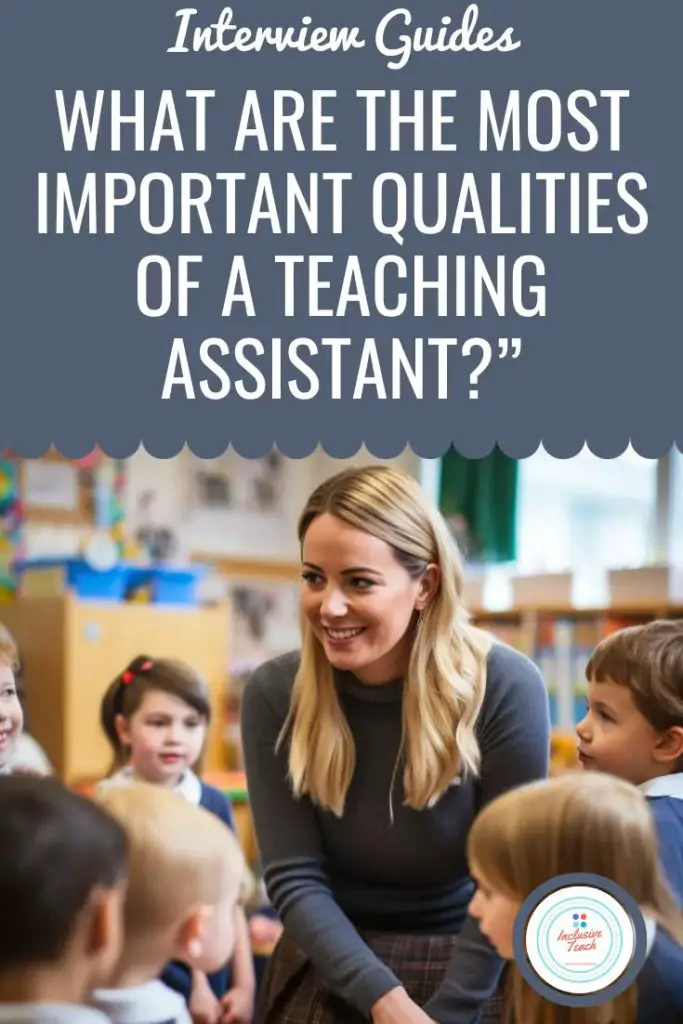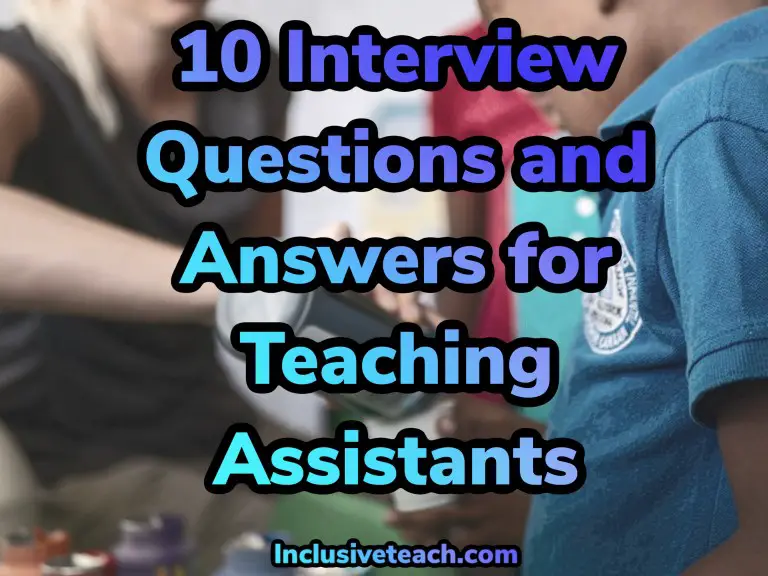How to answer an interview question “What are the most important qualities of a teaching assistant?”
What is a Teaching Assistant?
A teaching assistant is responsible for supporting pupils with special educational needs in the classroom. The main duties include working alongside classroom teachers to plan and implement lessons, providing one-on-one support to pupils, and helping to create a positive learning environment. This may be in a mainstream school, a special school, or an alternative provision. The are a number of common qualities of a teaching assistant that schools will be looking for. These key strengths of a teaching assistant do not just lie in experience working in schools.
The job offers a chance to make a real difference in the lives of pupils with special needs, as well as an opportunity to develop your skills and gain valuable experience in the field of special education. Successful candidates will be able to prove during the interview that they are passionate about helping others and committed to providing the best possible support to pupils with special needs.
Once you have completed your application and personal statement. This post focuses on a key question I must have asked in hundreds of interviews “What are the most important qualities of a teaching assistant?”. In your interview you want to demonstrate the key strengths of a teaching assistant that you possess.
Check out this post for 9 more Teaching Assistant Interview questions and answers.
Qualities of a Teaching Assistant.
There are several important personal and professional qualities that a teaching assistant should possess. The list below consists of the key strengths a teaching assistant needs:
- Strong communication skills: A teaching assistant should be able to effectively communicate with students, teachers, and parents. This includes being able to clearly explain concepts, provide feedback, and listen actively.
- Patience: Teaching can be a challenging and rewarding job, but it can also be stressful at times. A good teaching assistant should be patient and able to handle difficult situations with professionalism.
- Adaptability: A teaching assistant may be asked to work with a variety of students with different learning and interaction preferences. It is important for a teaching assistant to be able to adapt to these different situations and find ways to support all students.
- Organisation and time management skills: A teaching assistant will often have a lot of responsibilities throughout the day. It is important for a teaching assistant to be organised and able to manage their time effectively to ensure that all tasks are completed efficiently.
- Empathy and understanding: A teaching assistant should be able to understand and relate to the students they are working with. This includes being able to recognise when a student is struggling, academically or emotionally, and finding ways to support their learning. To take this further I would add compassion.
- A passion for teaching: a teaching assistant should be passionate about education and helping students succeed. This passion can help motivate and inspire students, as well as make the job more enjoyable for the teaching assistant.
- Working as a team: Finally but especially important when working in a special school where you may be part of a team of 4 or more adults.
A Model Answer: “What are the most important qualities of a teaching assistant?”
“As a Teaching Assistant, I am experienced in ensuring that the classroom is ready for lessons. It is kept clean and safe at all times. I assist the teacher in preparing lesson materials and school equipment, and I am responsible for recording and reporting a pupil’s progress to the teacher. I help pupils stay focused during class hours, by providing guidance and support as necessary. I am also comfortable with supervising group activities, sports events, and school outings. I have experience in helping teachers manage student behaviour and I am able to provide a positive and safe learning environment for the children. Additionally, I am able to take care of children who are unwell or upset, and make sure that they are comfortable and regulated.”

Remember that the interviewer will use this answer to question you further. They will ask for examples from your experience. They want to see and hear your passion for the teaching assistant role as well as the key skills you possess.
Research Into the Qualities of Teaching Assistants
There is very limited research on the characteristics of teaching assistants. Most focus on the impact of teaching assistants and specific interventions. Individual teachers will have other qualities they value in their support team. If you have worked with one who commented on you especially mention it. For me, one not mentioned would be Creativity. It is so important when working with children with SEN that at least one member of the team has a creative mind, able to do things a bit differently, push me to think more in-depth about what activities I am designing for the pupils.
We can extract elements of best practices from other studies. For example Radford (2015) talks about how important using the right kind of prompt is for using higher-level questioning. Less effective TAs would correct the pupil by giving them the answer. Whereas effective Teaching Assistants would use questioning to clarify and support the pupil to learn the right answer.
In conclusion, your response that demonstrates your key strengths should be sincere, mirror the school’s principles, and demonstrate a deep understanding of the position.
Ultimately, your answer holds the potential to leave a lasting impression on the interview panel. It’s not merely about the words you choose, but the authenticity and alignment with the school’s ethos that truly matter. By echoing the core values of the institution, you exhibit a genuine commitment to its mission. Furthermore, offering insights that delve beyond the surface illustrates your capacity to grasp the nuances of the role and its impact on the educational landscape. Your concluding statement is not just an endpoint to the interview; rather, it’s a stepping stone towards a potential journey of collaboration and growth within the school community.
50 Teaching Assistant Skills
Here is a list of 50 key teaching assistant skills you need to think about how you can demonstrate in your interview:
- Patience – The ability to remain calm and level-headed when working with students.
- Adaptability – Being able to adjust and modify activities to meet students’ needs.
- Organisation – Keeping educational materials and records well-organised.
- Communication – Communicating clearly and positively with students, teachers, and parents.
- Motivation – Encouraging and motivating students to engage in lessons and activities.
- Collaboration – Working cooperatively with teachers to support student learning.
- Reliability – Arriving on time and taking initiative to get tasks done without constant supervision.
- Creativity – Bringing creative ideas to lessons and finding innovative ways to support students.
- Empathy – Showing compassion and understanding towards students’ needs and feelings.
- Problem-solving – Finding solutions to challenges that arise with students or activities.
- Active listening – Fully concentrating on what students and teachers are saying.
- Time management – Prioritising tasks and managing time effectively throughout the day.
- Attention to detail – Catching mistakes and noting any changes in students’ performance or behavior.
- Technology skills – Able to use educational programs/technology to support learning.
- Conflict resolution – Helping to resolve disputes between students productively.
- Classroom management – Assisting with procedures that create an orderly, positive classroom environment.
- Multitasking – Able to manage multiple tasks and “wear many hats” effectively throughout the day.
- Student engagement – Keeping students actively involved and on task during lessons.
- Data tracking – Accurately collecting data on student growth, performance, and goals.
- Instructional support – Reinforcing skills and concepts taught by the teacher in small groups or one-on-one.
- Professionalism – Maintaining appropriate appearance, conduct, and boundaries at all times.
- Teamwork – Working together with all school staff towards shared educational goals.
- Confidentiality – Protecting students’ privacy by not disclosing sensitive information.
- Stress management – Staying calm and focused during high pressure situations.
- Cultural awareness – Honoring and being sensitive to diverse cultural backgrounds and needs.
- Positive attitude – Approaching all aspects of the job with enthusiasm and dedication.
- Flexibility – Adjusting to changing priorities and work duties day-to-day.
- Parent outreach – Communicating with parents to provide updates and get their vital perspectives.
- Classroom setup – Preparing materials, bulletin boards, and displays to create an organized, inviting classroom.
- Record keeping – Maintaining accurate attendance records, grades, and assessment data.
- Behavior management – Reinforcing positive behavior and addressing negative behavior appropriately.
- Differentiation – Adapting teaching strategies to meet each student’s individual learning needs.
- Experimentation – Trying creative ideas and new methods to find what works best for each student.
- Sense of humor – Bringing fun, laughter, and high spirits into classroom activities when appropriate.
- Autonomy – Taking initiative to recognize tasks that need to be done and jumping in without waiting to be told.
- Decision making – Using good judgment when making independent choices related to students or activities.
- Policy awareness – Understanding school policies, emergency procedures, education laws, and teacher responsibilities.
- Writing skills – Writing clear, accurate, and organized notes on observations, data, student needs, etc.
- Verbal de-escalation – Using words, tone, and body language to calmly resolve tense situations before they intensify.
- Emotional intelligence – Managing one’s own emotions skillfully and understanding students’ emotions and behaviors.
- Collaborative discussion – Participating in productive team meetings to troubleshoot issues and share best practices.
- Curriculum support – Assisting with designing and preparing effective educational resources and materials.
- Student evaluation – Providing constructive feedback to help students reflect on strengths, weaknesses, and goals.
- Energetic – Maintaining high energy and enthusiasm when interacting with students for long periods.
- Delegation – Identifying tasks appropriate to assign students for increased responsibility and growth.
- Knowledge of child development – Understanding how children learn and grow socially, emotionally, physically, and cognitively.
- Passion – Having a genuine interest in educating and caring for children.
- Resourcefulness – Making the most of available resources to create engaging learning experiences.
- Leadership – Exhibiting confidence, initiative, and decision-making skills.
- Lifelong learning – Continually building one’s own skills and knowledge through ongoing education and training.
References on Teaching Assistant Qualities:
Radford, Julie, et al. “Scaffolding learning for independence: Clarifying teacher and teaching assistant roles for children with special educational needs.” Learning and Instruction 36 (2015): 1-10.








One Comment